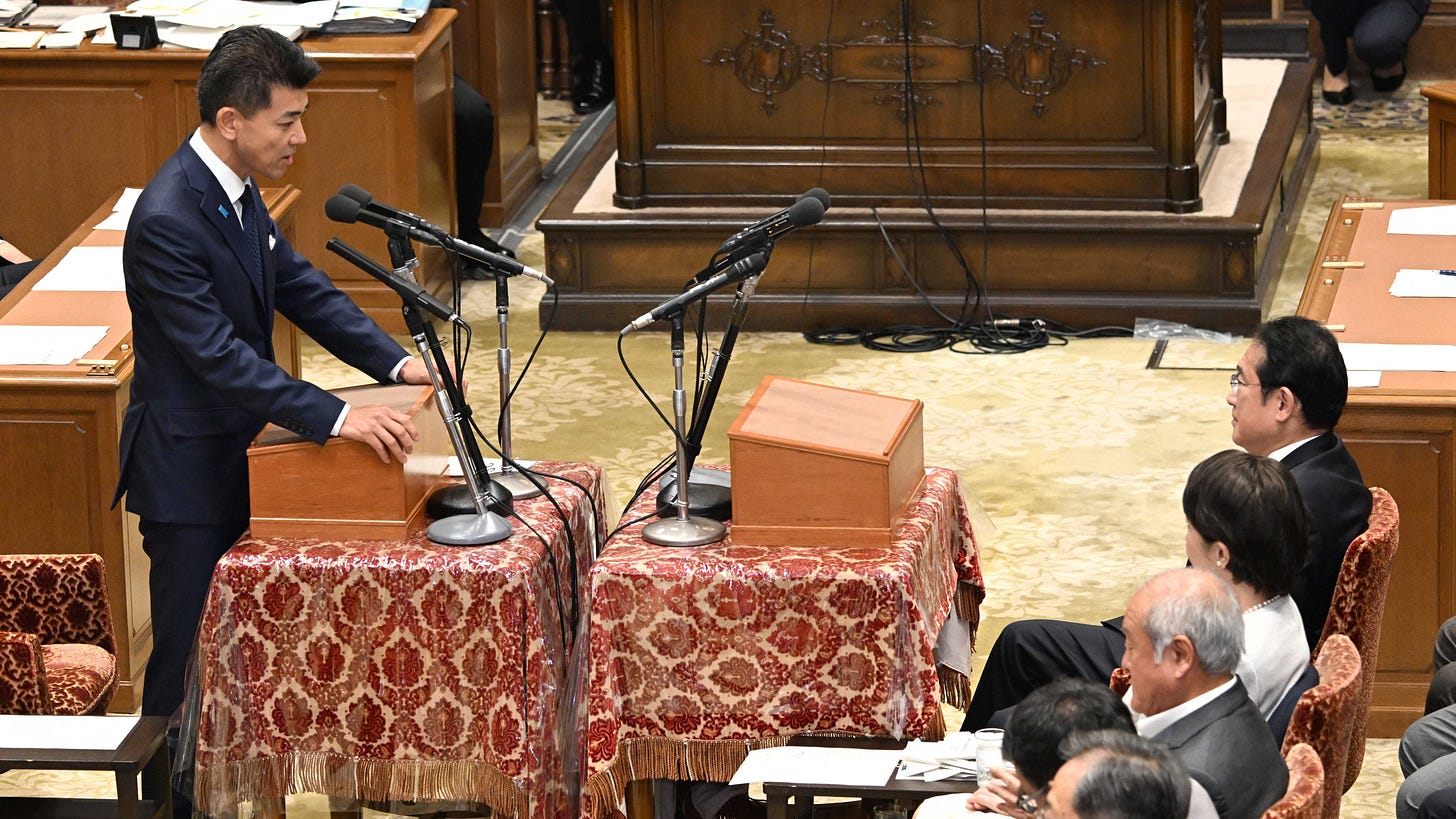Surrounded on all sides | This week in Japanese politics
The Diet session ends with Kishida besieged, while the Tokyo campaign gets underway
Thank you for reading Observing Japan. “This Week in Japanese Politics” is published on Friday or Saturday for paid subscribers.
I am thinking of launching a monthly conference call exclusively for paid subscribers. I would be interested in readers’ thoughts on how to format the conference call. Please share your opinions in the survey below (now fixed).
If you are looking for timely, forward-looking analysis of the stories in Japans’s politics and policymaking that move markets, I have launched a new service through my business, Japan Foresight LLC. For more information about Japan Foresight’s services or for information on how to sign up for a trial, please visit our website or reach out to me.

The final days of the ordinary session of the Diet — which formally ends on 23 June — saw the passage of political reform legislation and the first leaders’ debate in three years. Kishida heads into the recess under siege within his own party, as lawmakers have become increasingly vocal about Kishida’s not running for reelection and potential candidates have stepped upon their preparations. In Tokyo, the gubernatorial campaign began ahead of the 7 July vote, with a record number of candidates in the race. Meanwhile, the Ministry of Finance shrugged off Japan’s inclusion on the US Treasury’s currency manipulation watchlist, as the weak yen fueled a continuing trade deficit and a report showed that it has sharply reduced the real increase in defense spending.
Politics
The House of Councillors passed the political reform bill on Wednesday, 19 June, with only the LDP and Kōmeitō voting in favor. The reform, which will take effect on 1 January, lowers reporting requirements for purchasers of tickets to fundraising parties; requires lawmakers to certify their financial reports; and will require posting reports online. Opposition parties, however, said that without on the number of fundraising parties, donors will be able to sidestep limits and more broadly criticized the legislation for not considering an outright prohibition on corporate donations. After supporting the bill in the lower house, Ishin no Kai voted against it due to what it said were broken promises by the prime minister.
After the legislation passed, party leaders held the first party leaders’ debate since Kishida became prime minister on Wednesday, 19 June. The debate may be mostly remembered for a remark by Democratic Party for the People (DPFP) leader Tamaki Yūichirō, who noted that the prime minister is “surrounded on all sides,” which Kishida tried to deny. Mainichi reports that applause from LDP lawmakers for Kishida during the debate was conspicuously absent. Constitutional Democratic Party (CDP) leader Izumi Kenta sought to pressure Kishida into calling a snap election but did not succeed.
Following the leaders’ debate, the Constitutional Democratic Party submitted a no-confidence motion in the House of Representatives on 20 June that was defeated by the ruling coalition without any defections. The CDP, DPFP, Ishin no Kai, and Japanese Communist Party (JCP) all supported the motion.
With the LDP’s political reform bill passed and the parliamentary session effectively over, Prime Minister Kishida Fumio apologized to a caucus of LDP lawmakers on 21 June for the chaotic process of revising the LDP’s proposal, stating that he intervened in the process to protect the party. The apology will do little to quiet the dissatisfaction among LDP backbenchers who – like Asō faction member Saitō Hiroaki – have begun asking whether the prime minister ought to take responsibility for the party’s collapse in public support. Kishida’s meeting with the lawmakers came after he missed a meeting with them on 20 June, prompting Motegi faction member Tsushima Jūn to criticize the prime minister for his neglect. Meanwhile, Azuma Kuniyoshi, a first-term Diet member from Hokkaido, said at a meeting with local party members on 22 June that he hopes that Kishida will “not speak rashly” about seeking reelection. As lawmakers return to their constituencies following the end of the Diet session, remarks from LDP lawmakers about Kishida’s candidacy could become more brazen and more frequent.
Keep reading with a 7-day free trial
Subscribe to Observing Japan to keep reading this post and get 7 days of free access to the full post archives.





